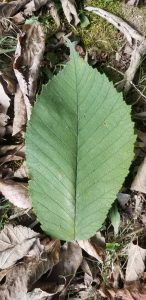Slippery Elm Herbal Supplement. What is Slippery Elm?
Slippery Elm, a cherished tree of the Eastern United States, once faced near extinction and remains scarce or significantly reduced across much of its natural range. Due to improper harvesting methods and commercial exploitation, this versatile tree continues to battle challenges from pathogens like the Dutch Elm Disease fungus, which has devastated millions of trees in our region. In Kentucky, however, our Slippery Elm populations are notably healthier and more abundant than in other states, a fact for which we are especially grateful.
Slippery Elm is commonly found in floodplain forest communities, often growing right up to the stream’s edge. This positioning frequently results in the trees falling, yet continuing to thrive for one more season as their roots remain partially attached to the trunk. Through decades of close observation of our forests, we have learned that these trees will inevitably die after another season or two. Thus, we harvest fresh, healthy, and vital inner bark from fallen Elms by boat, without the need to kill or damage standing trees. You can use our potent, concentrated Slippery Elm extracts with confidence, knowing that the population is not being harmed!
What are the Benefits of Slippery Elm?
The name Slippery Elm comes from the rich polysaccharide content of its inner bark, which becomes slippery to the touch due to its high concentration of soothing, nutritious, and healing substances. This texture is reminiscent of Aloe Vera gel, and like Aloe Vera, Slippery Elm mucilage heals every surface it contacts, both inside and outside the body. The bark is so nutrient-dense that it can even serve as an emergency food source.

Historically, individuals with weakened digestion, such as those recovering from a severe illness or injury, were fed Slippery Elm porridge because of its ease of digestion and life-giving properties. Not only is it nutritious, but it also has a slightly sweet flavor reminiscent of maple syrup, making it delicious as well. As a medicinal food, Slippery Elm imparts its anti-inflammatory effects throughout the body, particularly benefiting the digestive, respiratory, and urinary tracts. It is useful for a wide range of ailments, including colds, flus, and inflammatory conditions of the bowels. Additionally, the bark has a tonifying effect that can help reduce diarrhea, but as a ‘drying’ herb, it is contraindicated during constipation.



